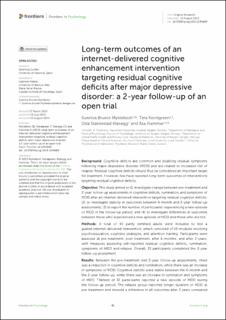| dc.contributor.author | Myklebost, Sunniva Brurok | |
| dc.contributor.author | Nordgreen, Tine | |
| dc.contributor.author | Klakegg, Oda Stakkestad | |
| dc.contributor.author | Hammar, Åsa Karin | |
| dc.date.accessioned | 2024-01-16T13:33:35Z | |
| dc.date.available | 2024-01-16T13:33:35Z | |
| dc.date.created | 2023-08-15T08:40:37Z | |
| dc.date.issued | 2023 | |
| dc.identifier.issn | 1664-1078 | |
| dc.identifier.uri | https://hdl.handle.net/11250/3111880 | |
| dc.description.abstract | Background: Cognitive deficits are common and disabling residual symptoms following major depressive disorder (MDD) and are related to increased risk of relapse. Residual cognitive deficits should thus be considered an important target for treatment. However, few have reported long-term outcomes of interventions targeting residual cognitive deficits.
Objective: This study aimed to (1) investigate change between pre-treatment and 2-year follow-up assessments in cognitive deficits, rumination, and symptoms of MDD after an internet-delivered intervention targeting residual cognitive deficits; (2) to investigate stability in outcomes between 6-month and 2-year follow-up assessments; (3) to report the number of participants’ experiencing a new episode of MDD in the follow-up period; and (4) to investigate differences in outcomes between those who experienced a new episode of MDD and those who did not.
Methods: A total of 43 partly remitted adults were included to test a guided internet-delivered intervention, which consisted of 10 modules involving psychoeducation, cognitive strategies, and attention training. Participants were assessed at pre-treatment, post-treatment, after 6-months, and after 2-years, with measures assessing self-reported residual cognitive deficits, rumination, symptoms of MDD and relapse. Overall, 32 participants completed the 2-year follow-up assessment.
Results: Between the pre-treatment and 2-year follow-up assessments, there was a reduction in cognitive deficits and rumination, while there was an increase in symptoms of MDD. Cognitive deficits were stable between the 6-month and the 2-year follow-up, while there was an increase in rumination and symptoms of MDD. Thirteen of 32 participants reported a new episode of MDD during the follow-up period. The relapse group reported longer duration of MDD at pre-treatment and showed a difference in all outcomes after 2 years compared to the no-relapse group. The no-relapse group showed improvement in MDD symptoms at post-treatment, while the relapse group did not.
Conclusion: Delivering cognitive enhancement interventions over the internet is potentially related to stable improvements in residual cognitive deficits. The effects on rumination and symptoms of MDD are less certain. Lack of improvement in MDD symptoms after the intervention period should be investigated as an indicator of relapse. Results should be interpreted with caution due to the lack of control group and sample size. | en_US |
| dc.language.iso | eng | en_US |
| dc.publisher | Frontiers | en_US |
| dc.rights | Navngivelse 4.0 Internasjonal | * |
| dc.rights.uri | http://creativecommons.org/licenses/by/4.0/deed.no | * |
| dc.title | Long-term outcomes of an internet-delivered cognitive enhancement intervention targeting residual cognitive deficits after major depressive disorder: a 2-year follow-up of an open trial | en_US |
| dc.type | Journal article | en_US |
| dc.type | Peer reviewed | en_US |
| dc.description.version | publishedVersion | en_US |
| dc.rights.holder | Copyright 2023 The Author(s) | en_US |
| dc.source.articlenumber | 1194689 | en_US |
| cristin.ispublished | true | |
| cristin.fulltext | original | |
| cristin.qualitycode | 1 | |
| dc.identifier.doi | 10.3389/fpsyg.2023.1194689 | |
| dc.identifier.cristin | 2166935 | |
| dc.source.journal | Frontiers in Psychology | en_US |
| dc.relation.project | Norges forskningsråd: 309264 | en_US |
| dc.identifier.citation | Frontiers in Psychology. 2023, 14, 1194689. | en_US |
| dc.source.volume | 14 | en_US |

